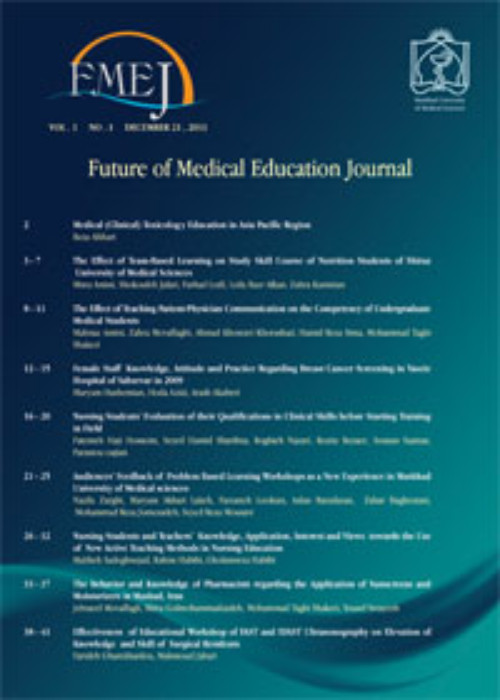Medical (Clinical) Toxicology Education in Asia Pacific Region
Author(s):
Abstract:
We previously showed that Medical Toxicology (MT) educational opportunities were very limited in Asia Pacific Region in 2008 (1). As a result, developing MT courses as an integrated part of the medical core curriculum across the continent was recommended. Modeling and marketing of existing MSc and PhD programs were also suggested (1). The current study is being designed to re-evaluate the status after 3 years. A predesigned questionnaire was sent out to the participants of the 10th Asia Pacific Association of Medical Toxicology (APAMT). A roundtable discussion was also held during the meeting on 14th Nov. 2011 to finalize the findings. The results are summarized in Table 1. As can be seen, MT courses are available to health, medical, nursing and pharmacy students in 2011. These courses should further integrate to the core curricula across the region to maximize the care provided to poisoned patients. Provision of Distance Learning Program (DLP) can also be effective for capacity development. MSc and PhD degrees by course and research or research alone are other available options. Some of the projects in terms of the management and study of natural toxins, organophosphate poisoning and drug abuse are unique in Asia Pacific Designing centralized accreditation process to evaluate existing training projects or poison centers via APAMT is suggested. Multicentre projects should be stressed. Wikitox is likewise available. Based on the previous experience of the panel, World Health Organization (WHO), United Nations Environment Program (UNEP), Academy of Sciences for the Developing World (TWAS), Commonwealth commission and Islamic Development Bank wwwwwwww were suggested as potential sources for PhD multicentre grants. An education task force will be formed by Chen-Chang Yang, Reza Afshari and Rahmat Awang with the co-operation of all other scientists affiliated with APAMT. The kind co-operation of the following scientists is acknowledged for providing information and volunteering to give further information for those who are interested in participating in these courses. Tackling missing data and addresses has probably contributed to increased information from 2008 to 2011. Australia (Andrew Dawson Andrew.dawson@sydney.edu.au), Bangladesh (Fazle Rabbi Chowdhury mastershakil @hotmail.com), India (Ashish Bhalla bhalla.chd @gmail.com), Iran (Reza Afshari (afsharir@mums.ac.ir), Malaysia (Rahmat Awang rahmat@usm.my & Sulastri Samsudin sulastri@usm.my), New Zealand (Wayne temple wayne.temple@stonebow.otago.ac.nz), Hong Kong (Thomas Chan tykchan@cuhk.edu.hk), Philippines (Kenneth Hartigan-Go khgo@aim.edu, Carissa Dioquino carissadio@ yahoo.com & Lynn Panganiban lcrpanganiban @uppoisoncenter. org), Sri Lanka (Indika Gawarammana), South Korea (Jinwoo Jeong advanced@lifesupport.pe.kr), Singapore (P. Gopalakrishnakone antgopal@nus.edu.sg), Taiwan (Chen-Chang Yang ccyang@vghtpe.gov.tw), Thailand (Wiani Wananukul winaiwananukul@gmail.com & Summon Chomchai siscd@ mahidol.ac.th), Vietnam (Pham Due, phamduehanoi @gmail. com).
Language:
English
Published:
Future of Medical Education Journal, Volume:1 Issue: 1, Dec 2011
Page:
2
magiran.com/p964416
دانلود و مطالعه متن این مقاله با یکی از روشهای زیر امکان پذیر است:
اشتراک شخصی
با عضویت و پرداخت آنلاین حق اشتراک یکساله به مبلغ 1,390,000ريال میتوانید 70 عنوان مطلب دانلود کنید!
اشتراک سازمانی
به کتابخانه دانشگاه یا محل کار خود پیشنهاد کنید تا اشتراک سازمانی این پایگاه را برای دسترسی نامحدود همه کاربران به متن مطالب تهیه نمایند!
توجه!
- حق عضویت دریافتی صرف حمایت از نشریات عضو و نگهداری، تکمیل و توسعه مگیران میشود.
- پرداخت حق اشتراک و دانلود مقالات اجازه بازنشر آن در سایر رسانههای چاپی و دیجیتال را به کاربر نمیدهد.
In order to view content subscription is required
Personal subscription
Subscribe magiran.com for 70 € euros via PayPal and download 70 articles during a year.
Organization subscription
Please contact us to subscribe your university or library for unlimited access!


